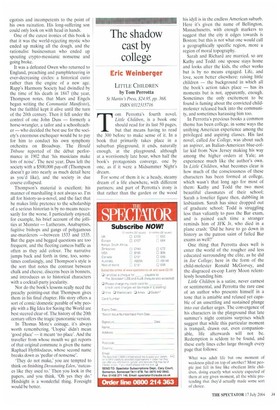The shadow cast by college
Eric Weinberger
LITTLE CHILDREN by Tom Perrotta St Martin's Press, $24.95, pp. 368, ISBN 0312315716 om Perrotta's fourth novel, Little Children, is a hook one should read for its last 50 pages, but that means having to read the 300 before to make sense of it. In a book that primarily takes place in a suburban playground, it ends, naturally enough, at the playground, although at a worrisomely late hour, when half the book's protagonists converge, one by one, as if it were a Midsummer Night's dream.
For some of them it is: a heady, steamy dream of a life elsewhere, with different partners; and part of Perrotta's irony is that rather than the garden or the wood his idyll is in the endless American suburb. Here it's given the name of Bellington, Massachusetts, with enough markers to suggest that the city it edges towards is Boston; but this is not what one would call a geographically specific region, more a region of moral topography.
Sarah and Richard are married, so are Kathy and Todd: one spouse stays home and looks after the kids, the other works but is by no means engaged. Life, and love, seem better elsewhere; raising little children — the background in which all the book's action takes place — has its moments but is not, apparently, enough. Sometimes the only excitement to be found is fuming about the convicted childmolester released back into the community, and sometimes harassing him too.
In Perrotta's previous books a common theme has been college, in some ways the unifying American experience among the privileged and aspiring classes. His last novel, called Joe College, was about such an aspirer, an Italian-American blue-collar kid from New Jersey making his way among the higher orders at Yale; an experience much like the author's own. In Little Children, what becomes clear is how much of the consciousness of these characters has been formed at college, which wasn't that long ago for most of them: Kathy and Todd the two most beautiful classmates of their school; Sarah a lonelier figure then, dabbling in lesbianism. Sarah has since dropped out of graduate school; Todd is struggling less than valiantly to pass the Bar exam, and is pained each time a stranger reminds him of JFK Jr, who died in a plane crash: 'Did he have to go down in history as the patron saint of failed Bar exams as well?'
One thing that Perrotta does well is enter the world of the rougher and less educated surrounding the elite, as he did in Joe College; here in the form of the child-molester Ronald McGorvey, and the disgraced ex-cop Larry Moon relentlessly hounding him.
Little Children is a satire, never earnest or sentimental, and Perrotta the rare case of an author who presents himself in a tone that is amiable and relaxed yet capable of an unsettling and sustained plunge into our darker urges. The convergence of his characters in the playground that late summer's night contains surprises which suggest that while this particular moment is tranquil, drawn out, even companionable, life afterwards will not be. Redemption is seldom to be found, and these early lines echo large through every page that follows:
What was adult life but one moment of weakness piled on top of another? Most people just fell in line like obedient little children, doing exactly what society expected of them at any given moment, all the while pretending that they'd actually made some sort of choice.


























































 Previous page
Previous page